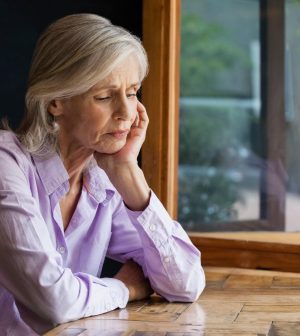- Could Your Grocery Store Meat Be Causing Recurring UTIs?
- Are You Making This Expensive Thermostat Error This Winter?
- Recognizing the Signs of Hypothyroidism
- 10 Strategies to Overcome Insomnia
- Could Artificial Sweeteners Be Aging the Brain Faster?
- Techniques for Soothing Your Nervous System
- Does the Water in Your House Smell Funny? Here’s Why
- Can a Daily Dose of Apple Cider Vinegar Actually Aid Weight Loss?
- 6 Health Beverages That Can Actually Spike Your Blood Sugar
- Treatment Options for Social Anxiety Disorder
Survey Shows Loneliness Haunts Over 1 in 5 People

Loneliness strikes more than a fifth of people worldwide, a new survey warns.
In the Gallup survey published Wednesday, 23% of people said they felt lonely “a lot of the previous day.” Those experiencing feelings of loneliness often felt physical pain, worry, sadness, stress and anger, as well.
Beyond its emotional toll, loneliness is “a medical problem” that should be taken “very seriously,” psychiatrist Dr. Sue Varma told CBS News.
“It’s the equivalent of having somebody smoke 15 cigarettes per day, and we know that it affects our mind and our body,” she said. “It predisposes us to anxiety and depression. It increases our risk by 30% for heart disease, for stroke, 50% for dementia, and 60% for premature mortality.”
But there is a way to combat loneliness, she added.
“Look at the quality of your relationships and say, ‘Do I feel seen and validated and appreciated?’ ” Varma said.
“We want to have a mix of micro connections — talking to the barista, talking to your dog walker — but also deep and meaningful connections in your life, where you can feel vulnerable and open up to share,” she explained.
The survey also showed loneliness was worse for young Americans than older ones.
“It’s really unfortunate that as much as we want our children to succeed, the emphasis I feel is being put on academic achievement. And for kids, they’re looking at financial achievement and a lot of these goals, these milestones that were possible for us years ago, aren’t possible for them, mixing in climate change, war,” Varma said.
“They’re feeling alienated, they’re feeling disconnected and the places that they would turn to — friends, parents, coaches — are no longer sources of safe havens. They’re sources of stress because of this competition to succeed,” she added. “When I speak to high school students, they say, ‘I can’t remember the last time I did something fun, just for the sake of it, not for my resume.’ “
What can ease this angst?
Schedule socialization “as if it was a medical appointment,” Varma advised. “Your life depends on it, because the quality of our life depends on the quality of our relationships.”
More information
The American Medical Association has more on loneliness and health.
SOURCES: Gallup survey, July 10, 2024; CBS News
Source: HealthDay
Copyright © 2026 HealthDay. All rights reserved.










